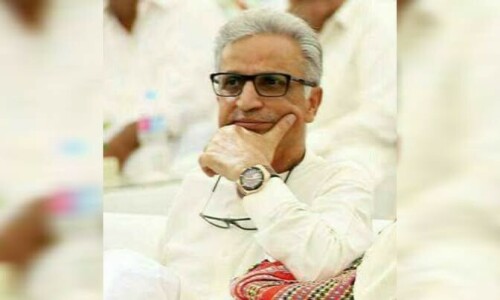ISLAMABAD: The power regulator on Thursday directed electricity distribution companies of formerly Wapda to refund Rs20 billion to consumers for overcharging them by 43 per cent in September.
At a public hearing presided over by its chairman Brig (retired) Tariq Sadozai, the National Electric Power Regulatory Authority (Nepra) concluded that the power companies should refund Rs2.77 per unit (kwh) to consumers in the billing month of November to pass on the impact of lower international oil prices.
The reduced rates will not be applicable to agricultural and domestic consumers using less than 300 units per month. As per the decision of the PML-N government, this is already a subsidised segment of population. Likewise, consumers of K-Electric will not benefit from the reduction either.
Raises questions about lower plant utilisation in Sept despite capacity availability
Mr Sadozai took notice of the lower plant utilisation by the power generation companies in September despite capacity availability. He said people were subjected to higher load-shedding only because the National Transmission and Dispatch Company (NTDC) utilised just 49pc of the available capacity.
“Why are you causing distress to the consumer when higher capacity is available?” he asked.
In response, NTDC Chief Engineer Amanullah Khan said load management of six to eight hours was in line with the government policy.
“How can depriving the people of electricity be the government policy even though electricity is actually available in the system?” Mr Sadozai said. He also sought a written explanation from the Ministry of Water and Power with regard to the so-called policy of lower plant utilisation and higher load-shedding. He also asked the NTDC to file a written statement on the issue.
He said power plants that were capable of producing cheaper electricity were kept closed while expensive plants were utilised. A Nepra official reported that consumers were deprived of additional benefits amounting to Rs6bn because of the lower utilisation of cheaper plants.
The Nepra staff also reported that in some cases electricity was produced at Rs12 per unit using high-speed diesel even though cheaper plants that ran on furnace oil and gas were available.
The Nepra chairman also sought an explanation as to why the Nandipur power plant was not being utilised for two months. He said the regulator disposed of all petitions regarding the Nandipur plant, but the government had still not issued a tariff notification.
The Central Power Purchasing Agency (CPPA) and NTDC had sought a reduction of Rs2.76 per unit in the fuel-based power tariff based on the actual fuel cost of the power generation in September.
Under the practice in vogue, distribution companies charge power consumers an estimated fuel rate that is adjusted against the actual cost in the subsequent month with the approval of the power regulator.
The CPPA claimed that it sold about 10.034bn electricity units to consumers in September at a total cost of Rs36.85bn. It said the power companies had charged reference fuel charges of Rs6.43 per unit to consumers while the actual fuel cost came out at Rs3.67 per unit.
The CPPA reported that the furnace oil-based power generation cost stood at Rs7.6 per unit compared to the gas-based average cost of Rs5.24 per unit. The fuel cost of diesel-based plants was reported at Rs12.33 per unit. There was no fuel cost for hydropower plants while the per-unit cost of nuclear plants was Rs1.16. The fuel cost of electricity imported from Iran stood at Rs10.6 per unit.
It said the hydropower generation contributed the biggest share (41.2pc) in total energy produced. Furnace oil-based plants generated about 26pc while gas-based plants generated 22pc for the national grid. Nuclear and diesel plants contributed 4pc and 1pc, respectively, to the energy mix.
Published in Dawn, October 28th, 2016













































